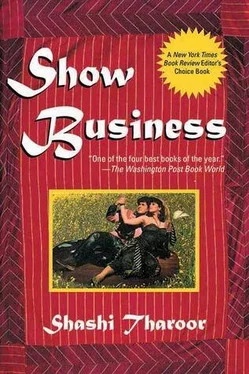What did she tell you? I can’t believe you didn’t ask. Or was she so offended by the question, you couldn’t insist on the reply? I can imagine her, all hurt pride and tears, as you cast implied aspersions on her moral standards. Well, you must have thought, I can always find out on the night. But then she was a bloody good actress, wasn’t she? And there can be so many reasons for an absence of blood.
So did you really ever feel sure, Ashok Banjara? Could you easily bear to look at me and wonder whether I’d felt your wife between the sheets before you even realized she existed? Oh, I bet that burned you up.
Or maybe not. After all, you were lucky in the things that really mattered. There had been no publicity: in those days neither Maya nor I was important enough for anyone to write about our relationship. There were no gossip-column stories about us, neither of us gave Showbiz interviews in which we could refer to the other as “just good friends,” even the industry didn’t pay us that much attention. After Godambo it might have been different. But by then it was all over between Maya and me.
You won’t believe this, but sex was not the important thing with Maya. No, I’m not going to put you out of your misery and admit to — boast about — having taken her to bed. That might matter to you, but I see no reason to oblige. We were close, very close, as close as I could ever have hoped to be to Maya. How close that was is not for me to tell you, Ashok Banjara. It’s between your wife and you: whatever she told you, whatever she wants you to believe, is fine with me. What mattered to me was something I couldn’t have.
I still remember the evening. It was just after we’d completed Godambo, doing the last bit of dubbing. I waited for her to finish her recording with you and Abha — she and I had so few scenes together, after all — and drove her home. Only I didn’t go home. I stopped the car at Worli, by the sea-face where that expensive hotel has gone up. It wasn’t there then. We stood by the seaside, letting the warm breeze from the Arabian Sea blow specks of spray through our hair. The evening stretched across the horizon like a woman waiting to be embraced. I turned to her, took her in my arms. At first, unresisting in surprise, she allowed herself to be enfolded in them, but she stiffened as I began to speak.
“Maya, I want us to be married. I can’t promise you a big house, or lots of money. But I love you, Maya. I’ll be good to you.”
She pulled herself away, not harshly, but firmly. “Pranay, what are you talking about? What is all this talk of marriage?”
“Why not? You know what you mean to me.”
She looked away then, to the streaks of orange and blue that were the sun’s farewell testaments for the day. When she spoke her voice was steady, but the steadiness came with effort. “You’ve been very good to me, Pranay. Very sweet, and very kind. I’ll never forget that.”
“Thanks, but no thanks,” I interjected bitterly. “I’m not standing here looking for gratitude.”
“But I am grateful.”
“Is that all? Are you saying that — everything we’ve had doesn’t mean anything more? Don’t you care for me at all?”
“I care for you.” Her voice was low.
“And I care for you! Marry me, Maya — I’ll make you happy.”
“I’m sorry, Pranay.” She looked at me for a moment, and I swear I saw a wetness in her eyes, but she turned away again and spoke without looking at me. “But I just don’t love you, that’s all.”
“Why not?” I wanted to rail. But I was shattered, and hurt, and suddenly very desperate. “It doesn’t matter,” I found myself pleading. “Love will come afterward. It always does. Look at all the arranged marriages that take place in our country. Do you think any of these people love each other? They haven’t even seen each other properly, for God’s sake! Love comes, in its own time. I’ll wait for you to learn to love me. Just like an arranged marriage.”
She looked at me directly, and her eyes were as dry as her tone. “No one,” she said, and not even her voice could sweeten her blunt-ness, “would arrange our marriage, Pranay.”
I gaped at her wide-eyed and understood there was nothing more to say.
I drove her home in silence. As she opened the car door, she turned to me in her seat. “Thank you, Pranay,” she said. And she leaned over and gave me the briefest, saddest kiss I have ever had. On my narrow, paan-stained mouth.
Then she was gone, and the door of my car clicked faintly closed. She had not pushed it hard enough. I sighed. I would have to open and shut it again, only this time much, much harder.
Godambo was a hit. You were a star after your second film. Maya was noticed — by other producers, by you. They wanted her innocence, as you did.
I didn’t do too badly myself out of that film. Offers came for better roles. As a villain, of course, but not just a secondary one. I got scripts in which I survived till the last reel and in the end fell at the hera’s hands, not in some bumbling accident like that stupid floor trap. I played all the parts a villain could hope for. The rapacious moneylender, the seth-sahukar, preying on the womenfolk of the poor hero’s indebted family. The tyrannical landlord, flogging his servants and lusting after his tenants’ wives as he canters through his extensive domains on horseback (all this when zamindari had long been abolished in the world outside the film studio, but the picture was always set in an undefined, vaguely contemporary period). The city gangster, in checked jackets and ill-fitting sharkskin suits, drinking incessantly, blowing smoke rings at a sequined vamp, and generally having a wonderful time until brought to book by an improbably honest cop for some carefully unspecified crime. I played them all, and as my screen credits grew with my bank balance, I put the money I couldn’t legally show the bank into a place of my very own in Juhu. And I watched you and Maya from afar.
Three films, that’s all you gave her. Three films, all opposite you, for the actress who was the brightest, freshest talent in the Hindi cinema of her day. Three films to prove her worth, to capture the heart of the Indian public and to break mine. Three films before you obliged her to “retire” so you could marry her.
And I wasn’t in any of them. Probably just as well, because I’m not sure I would have been able to bear losing her to you every day, on and off the set. To be obliged to succumb to you on screen, and to watch her succumb to you between takes.
I wonder when it all began. I suppose with Ganwaari, just after Godambo, when Maya made the transition from sisterly schoolgirl to girlish heroine and Abha from heroine to supporting actress. The famous film about the village girl (Maya was a natural for that part, wasn’t she?) who wins a competition to come to the city and spend a week watching her favorite movie star (you, who else?) at work. Surprise, surprise, the worldly-wise Hindi film hero is completely won over by the innocent village belle and spurns his cinematic leading lady (Abha, whose rage seemed genuine) to clinch the ganwaari girl at the fade-out. I hated the film, but it was an unexpected success at the box office; it made Maya, and it confirmed you in stardom. Even then, before it was known that your interest in Maya was extending offscreen as well, I saw the movie as symbolic, a portent. And everywhere I went, on street corners, at wedding receptions, in holiday processions, I kept hearing that wretched song from the film:
Is it true? Can it really be?
Is it a dream, or can this be really me?
Standing he-eere, in your embrace …
Читать дальше












